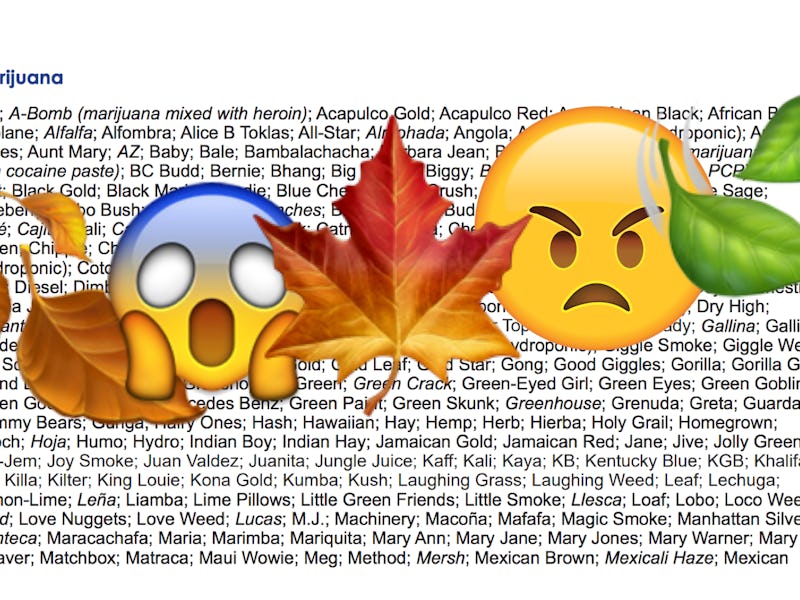A DEA Agent Explains How the Agency Gets Its Absurd Weed Slang
And Inverse accidentally tells the DEA about weed emojis.

The internet reacted with delight when the US Drug Enforcement Agency released an updated list of slang terminology used in the recreational, illegal (at least federally) drug trade. A huge section is devoted to marijuana, and some wild new terms include “shoes,” “my brother,” and “mowing the lawn.”
Inverse attempted to get to the bottom of the sources of the odd new terms by chatting with a DEA representative, who claimed to have years of experience in the field doing drug busts. Here’s what we found out.
Why Are the Weed Slang Terms so, Well, Weird?
According to Wade Sparks, special agent and staff coordinator for the DEA’s Office of National Media Affairs, the way the DEA Intelligence Division finds slang terms for its list is by sourcing information from DEA regional agencies, law enforcement, analysts, informants, and other federal agencies across the entire country.
“These words are coming from an incredibly large pool of people,” Sparks said. “There are words people have never seen before, so they’re outrageous to them, but in some parts of the country people are using them.”
Describing his personal experience, Sparks explained to Inverse that the list includes nicknames for drugs that vary from literal street corner to street corner: “I’d be interviewing an agent in the morning who used a heroin slang term I’d never heard before, and then on the same day, in the same place, an agent I’d interview later wouldn’t have any idea what I was talking about. The terms are community-based.”
Additionally, Sparks tells Inverse the list is meant to function more as a resource for the administration and law enforcement agencies than for the general public.
“I am aware of the criticism, but if we don’t include words like ‘doobie’ you’ll have people asking why, since Cheech and Chong said it,” Sparks said. “And I actually highly encourage people to call their local DEA office if they have suggestions.”
What About Emojis?
This is where the conversation sort of went off the rails. Inverse originally planned to ask the DEA if they would consider, or had already pondered, adding emojis to the list of weed slang. After all, emojis are crucial to online interaction, from Facebook reactions to buying and selling drugs like weed on apps like Tinder and Snapchat.
The DEA representative was surprised by the line of questioning, explaining that his own interest had been piqued, and that he would get back to us later in the day. A few hours later, he called and delivered the news: the Intelligence Division had heard Inverse’s suggestion, and would probably add emojis to the list next year.
“I don’t know how much credit you’ll want to take for that, in case your readers get mad at you,” the representative told Inverse. So yes, it’s true — we unintentionally may have ratted out the hordes of teenagers who put “looking for 🍂” in their Tinder bios to symbolize marijuana. Sorry!
Theoretically, the representative said, the DEA isn’t going to be too concerned with neighborhood purchases of small amounts of marijuana. They use their intelligence to go after cartels moving kilos of cocaine across the border — but, he adds, they’re always willing to listen to tips from the public. Or, in our case, Inverse staffers calling the media hotline.